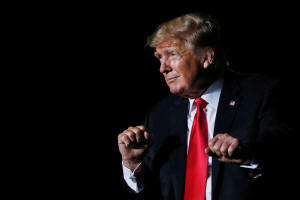Analysis-U.S. House panel's push for Trump criminal charges may fall
flat
 Send a link to a friend
Send a link to a friend
 [March 04, 2022]
By Jan Wolfe [March 04, 2022]
By Jan Wolfe
WASHINGTON (Reuters) - Former President
Donald Trump appears unlikely to face federal criminal charges for his
efforts to overturn his 2020 election loss despite a U.S. congressional
committee's court filing accusing him of illegal conduct, according to
legal experts.
"I'm not sure the Justice Department is even investigating this
criminally," said Ankush Khardori, a former trial lawyer for the Justice
Department's anti-fraud unit. "That's the open question."
Republican businessman-turned-politican Trump may have committed
multiple felonies in his effort to overturn his loss to Democrat Joe
Biden, a House of Representatives investigative committee stated in a
court filing on Wednesday. The Democratic-led committee was formed to
investigate last year's Capitol attack by a mob of Trump supporters who
tried to block formal congressional certification of Biden's victory.
The committee lacks the power to bring criminal charges on its own. But
the filing suggests that later this year it will formally urge the
Justice Department to carry out a criminal investigation of Trump - a
step known as a "criminal referral," said University of Minnesota law
professor Alan Rozenshtein, a former Justice Department national
security lawyer.

Rozenshtein called the filing "a preview for a criminal referral,"
adding: "It would be strange for the committee to take this step and
then pull its punches."
The committee said in the filing that Trump potentially engaged in
conspiracy to defraud the United States and may have obstructed an
official proceeding.
Trump in a statement on Thursday accused the committee of being
politically motivated and trying to prevent him from running for
president again.
Justice Department officials did not immediately respond to a request
for comment.
The committee revealed the findings in a legal brief arguing that it
should be allowed access to thousands of emails sent by John Eastman, a
lawyer who advised Trump on a plan to try to invalidate election results
in key states. Eastman sued the committee in December, seeking to block
a subpoena requesting that he turn over the emails.
While the filing is a major development, Garland has long appeared
hesitant to charge Trump, and the committee's latest revelations may not
change the attorney general's thinking, Rozenshtein said.
'NIGHTMARE SCENARIO'
"We've seen Garland proceed very cautiously - to the chagrin of many
Democrats," said Jessica Levinson, a professor at Loyola Law School in
Los Angeles.
[to top of second column]
|

Former U.S. President Donald Trump reacts after his speech during a
rally at the Iowa States Fairgrounds in Des Moines, Iowa, U.S.,
October 9, 2021. REUTERS/Rachel Mummey/File Photo
 "It would be a monumental thing for
our nation if the Justice Department charged a former president with
a crime of undermining our democracy," Levinson added. "There could
be a lot of evidence, but the Justice Department is not going to do
it unless they have crossed every 't' and dotted every 'i.'"
A "nightmare scenario" for Garland would be charging Trump and then
failing to secure a conviction, Rozenshtein said.
"If you are going to prosecute a politician, especially someone like
Trump, you want to do it on the strongest possible grounds,"
Rozenshtein said.
The Justice Department is investigating the Capitol riot and has
charged about 750 people in connection with the violence.
"We will follows the facts wherever they lead," Garland said in a
January speech marking the anniversary of the attack, adding that he
"remains committed to holding all Jan. 6 perpetrators, at any level,
accountable under law."
Asked in February if the department had any concerns about bringing
charges against a former president, Garland said he could not answer
a hypothetical question and would not talk about whether or not it
has ongoing investigations.
There is little indication that the department is focusing on
Trump's inner circle, Khardori said.
"All the public indicators suggest there is not a concerted
investigation into this part of what went into January 6 - the
non-violent machinations," Khardori added.
Trump and his allies have made false claims that the 2020 election
was stolen from him through widespread voting fraud.
Khardori said it appears that the Justice Department is letting
prosecutors at the state level and congressional investigators take
the lead in investigating Trump's efforts to stay in power.

Under U.S. law, crimes such as fraud and conspiracy require proof of
criminal intent - known as "mens rea," or a guilty mind.
Demonstrating that Trump had such intent may be difficult, according
to Rozenshtein.
"That doesn't mean that Trump can't be held liable, but it does add
an interesting wrinkle that any prosecutor would need to think
through," Rozenshtein said.
(Reporting by Jan Wolfe in Washington; additional reporting by
Patricia Zengerle and Sarah N. Lynch; Editing by Will Dunham and
Scott Malone)
[© 2022 Thomson Reuters. All rights
reserved.] This material may not be published,
broadcast, rewritten or redistributed.
Thompson Reuters is solely responsible for this content. |